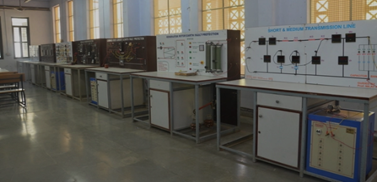12 day's Refresher Course (RC-O-03)
VIEAT successfully organized a two-week Refresher Course (RC-O-03) on “Research Paper Writing Excellence".
The Electrical Engineering Department is one of the core branches of VIEAT, Vidhyadeep University, located in Anita, Kim, Surat, and was established in 2011. The department is active in teaching and research in the areas of Power Electronics, Power Systems, Electrical Machines, and Control Systems.
Engineering and technology, especially electrical engineering, have the potential to address many social challenges. Electrical engineers play a crucial role in the development and application of new technologies. While power systems have long been a primary focus of the field, the emergence of power electronic devices has brought transformative changes, making power electronics a key enabler in modern power systems.
Our institute offers the best faculty in power systems, power electronics, and other electrical engineering domains. The department is supported by a team of experienced, dedicated, and highly qualified faculty members from reputed institutions.
Upon completing the Electrical Engineering program, students will be equipped with the skills to design, analyze, adapt, troubleshoot, and install electrical systems. They will be prepared to pursue careers in diverse sectors such as energy, manufacturing, construction, telecommunications, IT networks, and intelligent building systems.
Course Duration: 4 Years
Intake: 90
Tuition Fees per Semester: Rs. 37,800
Eligibility: Passed 12th Science (PCM) examination from a recognized board with a minimum of 45% marks (40% for reserved categories).
Admission Procedure:
Duration: 2 Years
Intake: 27
Tuition Fees per Semester: Rs. 50,400
Eligibility: B.E./B.Tech in Electrical or equivalent
Admission: Through PGCET / Direct
For Admission Queries: 78628 30669 / 79906 59125
The Degree in Electrical Engineering at VIDUNI provides a solid foundation in electrical systems and emerging technologies. The program emphasizes practical learning, enabling students to gain hands-on experience through state-of-the-art laboratories and industry collaborations. Expert faculty guide students, ensuring they receive personalized attention and in-depth knowledge in various electrical engineering domains. With an updated curriculum aligned with industry trends, students are equipped to tackle real-world challenges and excel in their careers. The comprehensive approach at VIDUNI fosters innovation, preparing graduates to contribute effectively to the ever-evolving field of electrical engineering.

A Degree in Electrical Engineering at VIDUNI provides a strong foundation in electrical systems and emerging technologies, preparing students for diverse career opportunities. With hands-on learning, expert faculty, and industry collaboration, graduates are equipped to excel in various roles, including Electrical Engineer, Electronics Design Engineer, Power Systems Engineer, Control Systems Engineer, Automation Engineer, Project Engineer, Electrical Project Manager, Maintenance Engineer, Circuit Designer, and Research and Development Engineer. The program ensures that students are well-prepared to meet the demands of the industry, contribute to technological advancements, and drive innovation in their careers.


"Produce Employable Engineers who work in Environment-friendly Manner motivated by Innovation"
Our well-structured, standards-based sequence of meaningful experiences is designed to enhance students' practice and achieve proficiency in both content knowledge and applied learning skills. With the growing emphasis on value-based and skill-oriented education, our curriculum embraces this diversity, offering students a comprehensive learning experience.





